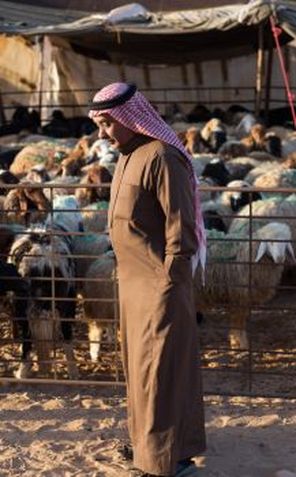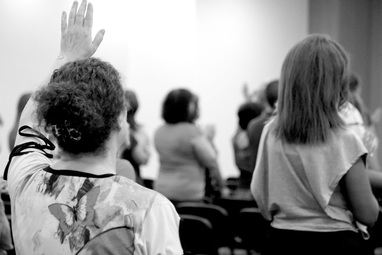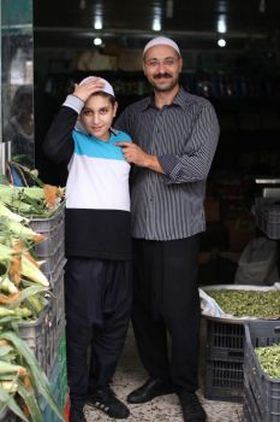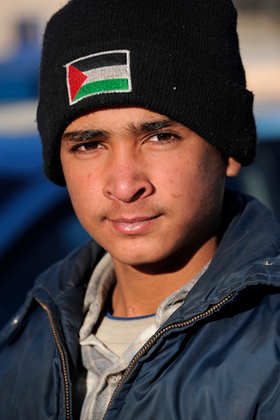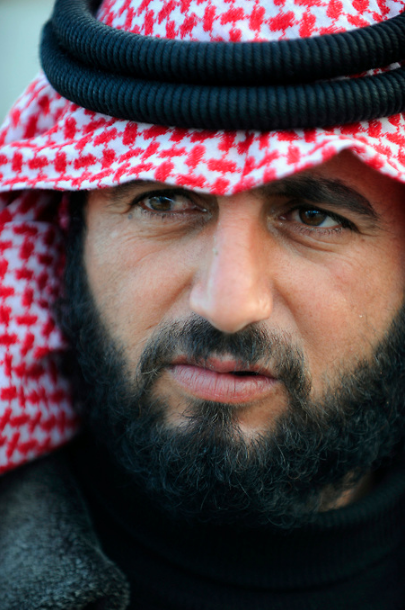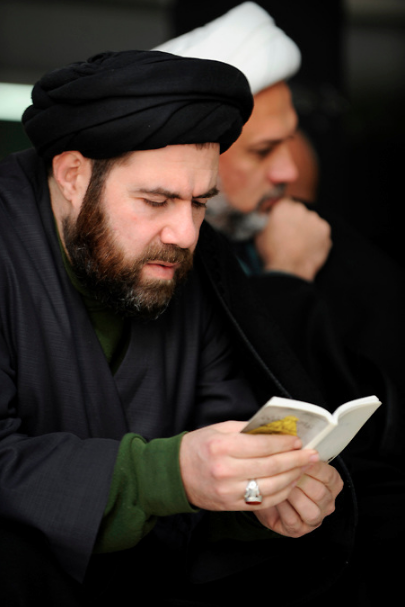|
The BedouinStanding with perfect posture by the rural road, his red and white head scarf flying in the wind, Hadi, a Bedouin, holds out giant rugs and blankets made from sheep’s wool. “Today I must sell at least two,” Hadi solemnly tells his friend selling other items next to him. Hadi is happy with his life even though by most people’s standards he does not have much. He has a large loving family, a small home made of cinder blocks, a number of livestock, and a satellite TV. Hadi doesn’t want to be rich; he just wants to be able to provide enough food and clothes for his family especially as the cold winter months begin.
Most Bedouin in Lebanon, Jordan, Syria and Iraq fall into two distinct social classes. “True” Bedouin are the class who continue to live as nomadic shepherds, while “modern” Bedouin practice farming and raise livestock, living more settled lives. Bedouin are masters of oral verse, an emotional and evocative form of poetry that is recited from memory in classical Arabic. Their important cultural values are hospitality, courage and honor.
|
ChristiansIndigenous Arab Christians live throughout Lebanon, Syria, Jordan, and Iraq. They are referred to as Christian because of their family upbringing. Instead of being like their neighbors who were born into a Muslim or Druze family, they are born into a Catholic, Greek Orthodox, or Evangelical family.
Throughout the Middle East, there are Christians who follow Christ and Christians who do not follow Christ. Think of Christians in these four lands as “cultural Christians” who follow Christ in name and tradition only, and “followers of Christ” as those who follow and love Jesus as their Lord and Master. While a number of followers of Christ in Lebanon, Syria, Jordan, and Iraq struggle to find appropriate ways to share their faith, there are many churches in these four lands taking the Good News to their neighbors.
|
The DruzeNidal spoke naturally and quite candidly. “My sister was a very wealthy, learned woman 800 years ago in her former life, and my brother, well, we are pretty sure he was a poor fisherman in his former life 1200 years ago.”
Druze actively believe in reincarnation, and practice secret rites and rituals. Their beliefs come from a mixture of Shiite Islam and Eastern religions. Fervent Druze dress distinctly and observe meticulous religious customs, while many Druze are Druze in name alone. The Druze of the Middle East live in Lebanon and Syria, as well as in northern Israel. An astonishing revival has been breaking out throughout the larger Druze community in recent years. Many Druze, including entire Druze families, have come to know Christ personally.
|
PalestiniansAbu Mahmoud lives in a poor area outside Amman, Jordan. On warm evenings he sits on his balcony sipping coffee, grasping a huge, old key. Born and raised in Palestine, Abu Mahmoud was forced to flee the fighting there over 60 years ago. Even though he is well over 70 years old now, he still affectionately remembers the layout of his house in Palestine, showing off the deeds to his family’s old property as he holds up that heavy, worn key to his old front door. As someone affected so directly by events in Israel, he doesn’t see any hope for peace, forgiveness, or reconciliation in the region.
Today there are over 400,000 Palestinians in both Lebanon and Syria, while around 3 million call Jordan home. The vast majority of these Palestinians long for the same things that people everywhere desire: freedom, peace, economic opportunities, access to adequate health care and a good education for their children. While many Palestinians are hard working, they often live in poverty and have few opportunities to change their situation. They are a people known for being fiercely loyal to their families and their faith. Although most Palestinians living in Jordan, Syria, and Lebanon have resided in those countries their entire lives, they are not recognized as citizens or given the same rights as citizens. Over 95% of Palestinian refugees are Sunni Muslim, but there is, however, a significant Christian minority among Palestinians.
|
Sunni MuslimsAbu Khalid and Um Khalid work hard every day at the small corner store they own in a busy part of the city where they live. Although they are not extremely devout Sunni Muslims, the couple is proud to be Sunni. Um Khalid always wears a veil to cover her hair, and the two, with their 7 children, are sure to celebrate important religious holidays. Both are friendly to people they meet and they are eager to share their faith in God and in Sunni Islam.
Comprising 85% of Muslims around the world, Sunni Muslims make up the majority of people in Syria and Jordan. Some Sunnis in Lebanon, Syria, Jordan, and Iraq are looking to find deeper power from God which they are unable to find within Sunni Islam, causing many of them to search for Truth.
|
Shiite MuslimZeina, a young Shiite Muslim, kept having the same dream over and over again. She saw herself in a desert, dying of thirst, barely able to walk, when she reached a cord of blood that blocked her way. In every dream, Zeina grabbed the cord of blood and fell to the cracked desert ground, sobbing uncontrollably.
God sent a Christ follower to be Zeina’s neighbor. One night, while visiting with her Christian neighbor and another Christ follower, they explained the meaning of the dream to Zeina. Over time, as Zeina heard God’s Truth and studied His Word with her neighbor, she chose to follow Christ. Today, Zeina actively shares her faith and dreams of thousands of Shiites like her loving and following Jesus. It is often through these supernatural encounters that numerous Shiites are coming to personal faith in Jesus. Typically, Shiite Muslims are passionate about being part of the “Household of Faith,” tracing their collective bloodline to the Prophet Mohammed. Shiite Muslims are the majority religious groups in Iraq. Many Shiites make pilgrimages to shrines in Iraq and in Syria, praying desperately at tombs of the Prophet Mohammed’s relatives.
|
